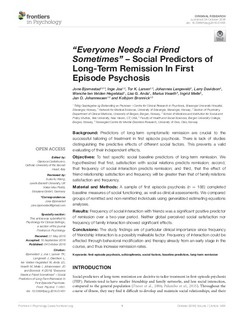| dc.contributor.author | Bjørnestad, Jone Ravndal | |
| dc.contributor.author | Joa, Inge | |
| dc.contributor.author | Larsen, Tor Ketil | |
| dc.contributor.author | Langeveld, Johannes H. | |
| dc.contributor.author | Davidson, Larry | |
| dc.contributor.author | Hegelstad, Wenche | |
| dc.contributor.author | Anda-Ågotnes, Liss Gøril | |
| dc.contributor.author | Veseth, Marius | |
| dc.contributor.author | Melle, Ingrid | |
| dc.contributor.author | Johannessen, Jan Olav | |
| dc.contributor.author | Brønnick, Kolbjørn Selvåg | |
| dc.date.accessioned | 2017-05-16T11:58:20Z | |
| dc.date.available | 2017-05-16T11:58:20Z | |
| dc.date.created | 2016-12-16T13:45:27Z | |
| dc.date.issued | 2016-10 | |
| dc.identifier.citation | Bjørnestad, J.R. et al. (2016) "Everyone Needs a Friend Sometimes" - social predictors of long-term remission in first episode psychosis. Frontiers in Psychology, 7 | nb_NO |
| dc.identifier.issn | 1664-1078 | |
| dc.identifier.uri | http://hdl.handle.net/11250/2442648 | |
| dc.description.abstract | Background: Predictors of long-term symptomatic remission are crucial to the successful tailoring of treatment in first episode psychosis. There is lack of studies distinguishing the predictive effects of different social factors. This prevents a valid evaluating of their independent effects.
Objectives: To test specific social baseline predictors of long-term remission. We hypothesized that first, satisfaction with social relations predicts remission; second, that frequency of social interaction predicts remission; and third, that the effect of friend relationship satisfaction and frequency will be greater than that of family relations satisfaction and frequency.
Material and Methods: A sample of first episode psychosis (n D 186) completed baseline measures of social functioning, as well as clinical assessments. We compared groups of remitted and non-remitted individuals using generalized estimating equations analyses.
Results: Frequency of social interaction with friends was a significant positive predictor of remission over a two-year period. Neither global perceived social satisfaction nor frequency of family interaction showed significant effects.
Conclusions: The study findings are of particular clinical importance since frequency of friendship interaction is a possibly malleable factor. Frequency of interaction could be affected through behavioral modification and therapy already from an early stage in the course, and thus increase remission rates. | nb_NO |
| dc.language.iso | eng | nb_NO |
| dc.publisher | Frontiers | nb_NO |
| dc.rights | Navngivelse 4.0 Internasjonal | * |
| dc.rights.uri | http://creativecommons.org/licenses/by/4.0/deed.no | * |
| dc.subject | psykose | nb_NO |
| dc.subject | first-episode psychosis | nb_NO |
| dc.subject | schizofreni | nb_NO |
| dc.subject | baseline predictors | nb_NO |
| dc.subject | schizophrenia | nb_NO |
| dc.subject | long-term remission | nb_NO |
| dc.title | "Everyone Needs a Friend Sometimes" - social predictors of long-term remission in first episode psychosis | nb_NO |
| dc.type | Journal article | nb_NO |
| dc.type | Peer reviewed | nb_NO |
| dc.description.version | publishedVersion | |
| dc.rights.holder | Copyright © 2016 the authors | nb_NO |
| dc.subject.nsi | VDP::Medisinske Fag: 700::Klinisk medisinske fag: 750::Psykiatri, barnepsykiatri: 757 | nb_NO |
| dc.source.volume | 7 | nb_NO |
| dc.source.journal | Frontiers in Psychology | nb_NO |
| dc.identifier.doi | 10.3389/fpsyg.2016.01491 | |
| dc.identifier.cristin | 1414092 | |
| cristin.unitcode | 217,7,2,0 | |
| cristin.unitname | Institutt for helsefag | |
| cristin.ispublished | true | |
| cristin.fulltext | original | |
| cristin.qualitycode | 2 | |

